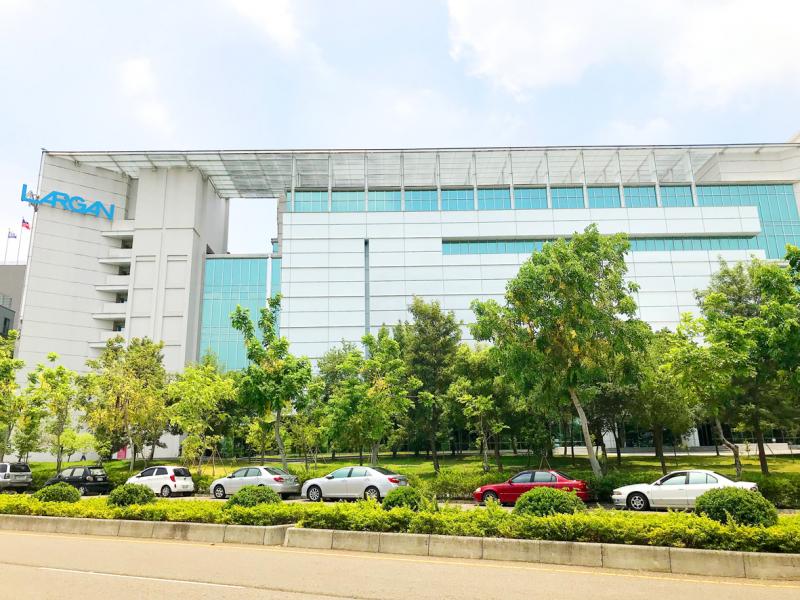Largan Precision Co (大立光), the nation’s leading handset camera lens manufacturer, yesterday posted a 25.77 percent quarterly decline in net profit for last quarter to NT$4.99 billion (US$168.7 million), reaching its weakest level in nine quarters due to sagging demand.
Largan in the first quarter made NT$6.72 billion in net profit, the company said.
Earnings per share in the last quarter dropped to NT$37.19 from NT$50.1 in the previous quarter.

Photo: Chen Mei-ying, Taipei Times
The Taichung-based company yesterday also booked a nonoperating loss of NT$536.42 million for the last quarter, reversing a nonoperating income of NT$414.64 million in the first quarter.
Gross margin fell slightly to 68.63 percent, compared with 69.8 percent in the first quarter, the company’s financial statement showed.
In an investors’ conference, Largan CEO Adam Lin (林恩平) gave conservative projections.
“I think July and August are going to be about the same as June,” Lin said.
Largan last month posted monthly revenue growth of 6.98 percent to NT$4.14 billion, ending two straight months of declines.
Regarding the company’s revenue outlook for September and October, Lin said: “I cannot see that far.”
Lin blamed softening demand rather than market share loss to competitors for the drop, saying: “Demand is down. Demand for high-specification products, especially” was down, Lin said.
When asked about the prospects of Chinese competition increasing next year, Lin said: “I do not know.”
Institutional investors in the conference said they were curious about the company’s plans for new continuous or fixed optical zoom lens products for smartphone cameras.
Lin said it would be a daunting task from a technical perspective to create the lenses with the limiting form factor of mobile phones and to achieve the high level of precision required to make the lens.
“Everybody wants this, but it is just hard,” Lin said.
The company’s freeform lens technology is in the testing phase, he said, adding that he is optimistic that by the end of the year, Largan would begin shipping the product.
Largan would keep pace with the research and development of new products, “but it is up to the clients whether they get designed” into new products, Lin said.

SELL-OFF: Investors expect tariff-driven volatility as the local boarse reopens today, while analysts say government support and solid fundamentals would steady sentiment Local investors are bracing for a sharp market downturn today as the nation’s financial markets resume trading following a two-day closure for national holidays before the weekend, with sentiment rattled by US President Donald Trump’s sweeping tariff announcement. Trump’s unveiling of new “reciprocal tariffs” on Wednesday triggered a sell-off in global markets, with the FTSE Taiwan Index Futures — a benchmark for Taiwanese equities traded in Singapore — tumbling 9.2 percent over the past two sessions. Meanwhile, the American depositary receipts (ADRs) of Taiwan Semiconductor Manufacturing Co (TSMC, 台積電), the most heavily weighted stock on the TAIEX, plunged 13.8 percent in

A wave of stop-loss selling and panic selling hit Taiwan's stock market at its opening today, with the weighted index plunging 2,086 points — a drop of more than 9.7 percent — marking the largest intraday point and percentage loss on record. The index bottomed out at 19,212.02, while futures were locked limit-down, with more than 1,000 stocks hitting their daily drop limit. Three heavyweight stocks — Taiwan Semiconductor Manufacturing Co (TSMC, 台積電), Hon Hai Precision Industry Co (Foxconn, 鴻海精密) and MediaTek (聯發科) — hit their limit-down prices as soon as the market opened, falling to NT$848 (US$25.54), NT$138.5 and NT$1,295 respectively. TSMC's

ASML Holding NV, the sole producer of the most advanced machines used in semiconductor manufacturing, said geopolitical tensions are harming innovation a day after US President Donald Trump levied massive tariffs that promise to disrupt trade flows across the entire world. “Our industry has been built basically on the ability of people to work together, to innovate together,” ASML chief executive officer Christophe Fouquet said in a recorded message at a Thursday industry event in the Netherlands. Export controls and increasing geopolitical tensions challenge that collaboration, he said, without specifically addressing the new US tariffs. Tech executives in the EU, which is

In a small town in Paraguay, a showdown is brewing between traditional producers of yerba mate, a bitter herbal tea popular across South America, and miners of a shinier treasure: gold. A rush for the precious metal is pitting mate growers and indigenous groups against the expanding operations of small-scale miners who, until recently, were their neighbors, not nemeses. “They [the miners] have destroyed everything... The canals, springs, swamps,” said Vidal Britez, president of the Yerba Mate Producers’ Association of the town of Paso Yobai, about 210km east of capital Asuncion. “You can see the pollution from the dead fish.